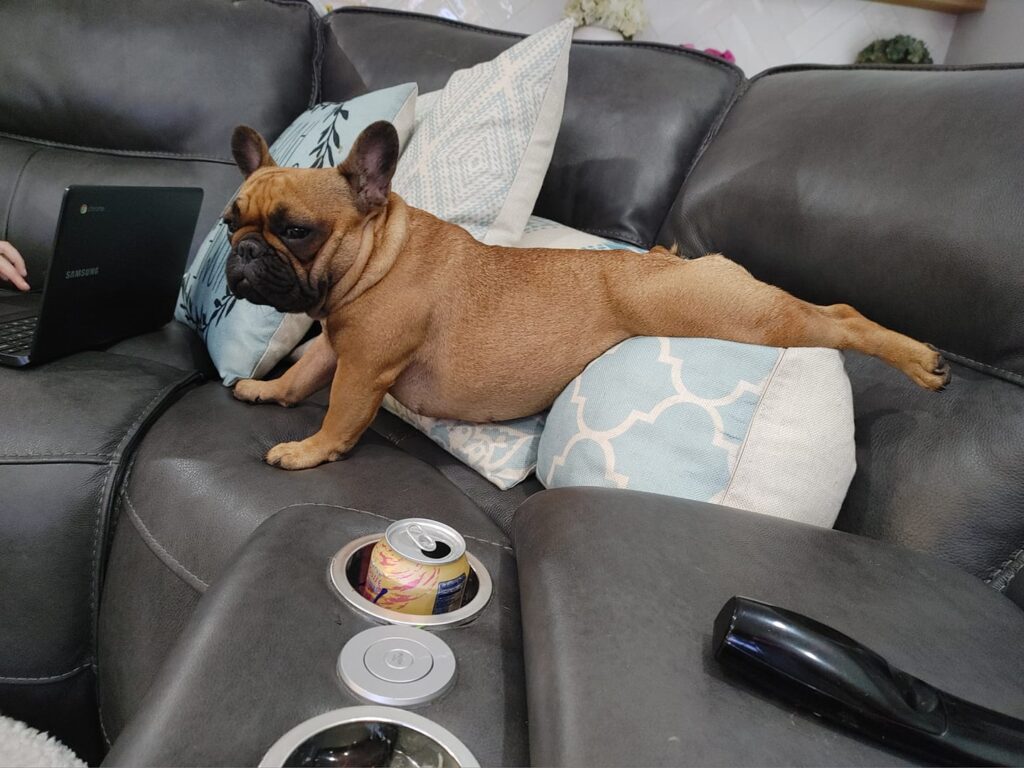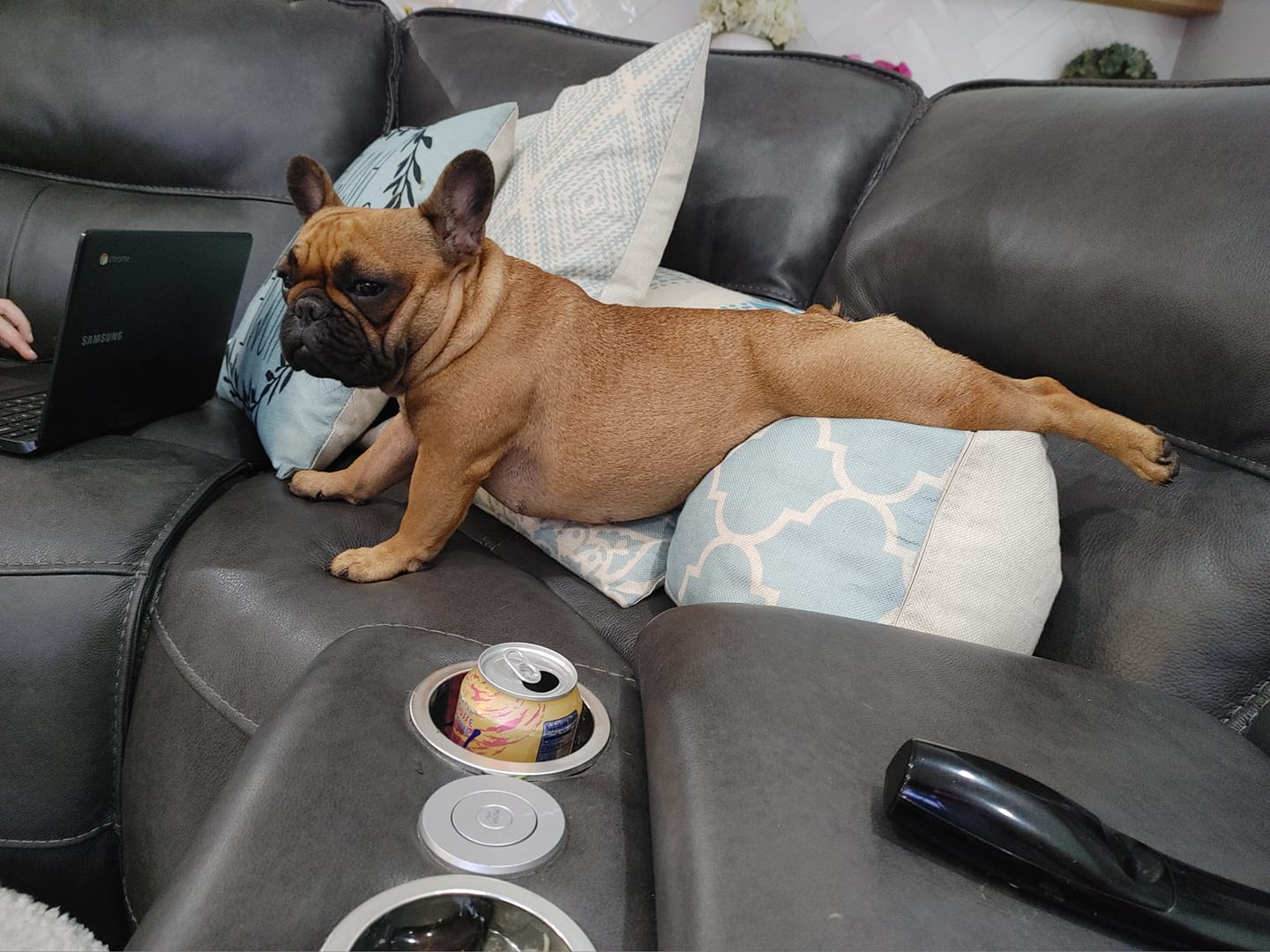Buying a French Bulldog:
For many people who have never purchased a pedigreed dog, the process can seem daunting and confusing. How do you select a breeder? How do you know if you’re working with a good breeder? How do you pick a puppy? Are you paying a good price?
Pet Quality vs. Show Quality:
First, you need to understand the basic terminology you will encounter to rate puppies that are offered for sale by kennels: pet quality and show quality. Understanding the difference in these designations is often as simple as looking at the offered price. Good breeders do what they do for one reason: a desire to improve the breed. When a puppy is not considered to be a superior example of the breed, the dog will be termed “pet quality.” For most of the rest of us, even when the supposed “flaws” are pointed out, all we see is a wonderfully cute and exuberant puppy. You will want a breeder to explain to you why the animal is considered pet quality over show quality, but since reputable breeders don’t sell unhealthy dogs, this is not a deal breaker, but standard procedure. Show quality animals can cost three times as much or more, so most of us can only afford pet quality pedigree dogs. French Bulldogs are typically reproduced via artificial insemination and it is not recommended that casual enthusiasts attempt breeding, so buying a pet quality Frenchie is the norm.

Required Spaying and Neutering:
When you buy a pet quality pedigree puppy it is standard for the breeder to require that the animal be spayed or neutered, typically before six months of age. The reasons for this policy are clearly tied to the primary reason for raising purebred dogs in the first place: improving the breed.
Pet quality puppies are, by their very definition, judged to be inappropriate for use in breeding programs. Also, breeders are very careful to in no way contribute to the activities of unscrupulous puppy mills.
Given the difficulty of breeding French Bulldogs, including the need for artificial insemination and delivery of puppies by Caesarian section, the requirement to spay or neuter young dogs is also a necessary safeguard of their health. If a pair successfully mated on their own, the unplanned pregnancy could easily prove fatal for the female.
Best Age to Purchase a Puppy:
A French Bulldog puppy should never be removed from their mother any earlier than 8 weeks of age (at the very earliest), and leaving them until they are 10 to 16 weeks of age is preferred. This will give them the extra time they need to learn important life skills from the mother dog, including eating solid food and grooming themselves. Also, a puppy left amongst their litter mates for a longer period of time will learn better socialization skills. Because dogs are descendants of wolves they are pack animals and prefer company, whether human beings or other dogs, to being alone. Without social contact they can become depressed and behave badly.
People who choose a dog that is not compatible with their energy and lifestyle.
will inevitably end up with a cascade of troubles, starting with an unhappy dog, which leads to behavioral issues, which will then lead to an unhappy family and an unhappy neighborhood.
How to Choose a Breeder:
Since I am not an advocate of shipping live animals, and this practice is strongly discouraged with Frenchies due to their issues with temperature extremes, look for a local breeder. Talk to your vet, get in touch with your local kennel club, or attend a local or regional dog show.
Going to a dog show is my favorite method for locating breeders because it gives you the chance to see examples of the kennel’s dogs. You won’t be arranging an adoption at the show, but you can collect business cards and pick kennels you’d like to visit. After you have a short list of breeders with whom you’re interested in discussing a potential adoption, plan to visit every one of the kennels in person. The best facilities are those that grant visitors full access.
By really getting a good look around, you’ll be able to make sure the dogs living there have enough space, that their areas are clean and free of odors, and that the animals are obviously cared for appropriately and well. You should feel that you are part of a free exchange of information.
You want a breeder who will talk about both the positives and the negatives of the breed. What to Expect from a Good Breeder Responsible breeders will do several things to help you pick a puppy and to make both sides in the transaction feel good about the adoption. The welfare of the dog should always be the central focus of all discussions.
When you are working with a good breeder:
You should always have the chance to see the puppy with the mother and its littermates (and if possible, the father). This is extremely important because it will give you an opportunity to judge the temperament of one or both parents, and to get a better sense of the puppy’s eventual size and body conformation. Note: Since almost all French Bulldogs are born after artificial insemination, it is likely the sire won’t be resident at the kennel. In the case of this breed, seeing the mother (dam) is sufficient. Rather than just seeing one puppy, a good breeder will let you see and handle all the puppies. Breeders are responsible for registering the litter with the governing kennel club and for choosing the dog’s official name.
Initially, each puppy will be registered in the breeder’s name, so a part of the adoption process involves the transfer of the dog’s registration, which requires the breeder’s signature. The process of transferring the registration should be fully explained to you.
The breeder should be able to describe to you how the puppy has been socialized and offer advice on how to continue this process after you get the dog home. Good breeders want to know where their puppies are going and what their lives will be like with their new masters. You should be prepared to answer questions about your home and schedule, your family, and any other animals with whom you live. Don’t take this as the breeder being nosy, but rather as an excellent sign of just how much they have invested in the placement of their dogs. If a breeder does NOT ask questions along these lines, be concerned.
What the Breeder Should Provide to You:
The breeder should supply all of the following to you and answer any questions you have about these items.
You should receive a contract of sale that details the responsibilities of both parties in the adoption of the dog. The document should also explain how the puppy’s registration papers will be transferred to you. There should be a written packet of information that offers advice on feeding, training, and exercise as well as necessary health procedures like worming and vaccinations. The breeder should include a pedigree of the dog’s ancestry either in handwriting or an official copy from the governing kennel club.
Make sure that you receive copies of all health records for the puppy (and parents), in particular what vaccinations the dog has received and the required schedule for booster shots. Good breeders also offer full disclosure of any potential genetic conditions associated with the breed, and are willing to discuss any testing that has been done to screen for these issues. You should also receive a guarantee of the puppy’s health at the time of adoption, which you will likely be asked to confirm, for the safety of both parties, by taking the animal to a vet for evaluation. There should also be a detailed explanation of recompense in the event that a health condition does arise within a set period of time.
Identification Systems for Pedigree Dogs:
When you adopt a pedigree dog, the animal may or may not have a means of permanent identification on its body. Systems used with pedigree dogs vary with each governing organization. The American Kennel Club recommends permanent identification as a “common sense” practice, with the preferred methods being tattoos or microchips.
In the United Kingdom, the Kennel Club is the only organization accredited by the United Kingdom Accreditation Service to certify dog breeders through the Kennel Club Assured Breeder Scheme. Under this program, breeders are required to permanently identify their breeding stock by microchip, tattoo, or DNA profile. Any dogs that will be traveling to or returning to the UK from another country can do so under the Pet Passport system, for which microchipping is a requirement.
All dogs registered with the Canadian Kennel Club must be permanently identified with either a tattoo or a microchip.
Warning Signs of a Bad Breeder:
The suggestion that visiting the kennel in person isn’t necessary. Offering to sell puppies sight unseen. Not being allowed to tour all parts of a kennel. Kennels that smell, are overly crowded, or where the animals seem nervous and apprehensive.
Instances where you are not allowed to meet the puppies’ parents. Unable to prove membership in any kennel club or to provide a pedigree that contains registration numbers and extends back three generations. Unable to produce health certification for the parents and puppies. Claims the health records will be sent at a later date.
Claims there are no health problems associated with the breed. (This is absolutely NOT true with French Bulldogs). Tells you that the puppy has been microchipped, but does not have a scanner to prove this fact or to verify that the identification number on the chip and on the bill of sale match. The breeder claims it is your responsibility to take the puppy to a vet after purchase.* No health guarantee provided and no policy for recompense in the event a health problem does arise.
Refusal to provide a signed bill of sale or says it will be given to you later. * Let me clarify this point. The adoption agreement will contain a health guarantee and will require you to have the puppy evaluated by a vet to certify that guarantee, for the protection of both parties. The puppy should, however, already have received a general check-up and initial vaccination.
Avoid Puppy Mills, Pet Shops, and Online Scams:
Puppy mills exist only to churn out as many dogs as they can at minimal expense and maximum profit. The dogs are raised in substandard and often horrific conditions with no concern about their health or behavior. Inbreeding is a huge problem, leading to genetic abnormalities and shortened lifespan. Such operations often take to the Internet and advertise their dogs as “rare” or in some way unusual. With French Bulldogs, these listings are frequently in reference to colors like blue, blue pied, blue fawn, slate, and lilac. These coats are not rare but are a sign of bad breeding. Every one of them raises the potential for chronic and often debilitating skin conditions.
In order to help fight the proliferation of these deplorable operations, avoid pet shops! Such establishments are prime outlets for dogs raised in puppy mills. If you cannot afford a pedigreed dog, adopt from a shelter or a rescue group. These entities have the best interests of the animals at heart and are often desperately trying to place dogs that would otherwise be euthanized. If you cannot visit the kennel in which the puppies were born, meet the parents, inspect all of the facilities, and receive complete genetic and health information on the dog, something is wrong.

